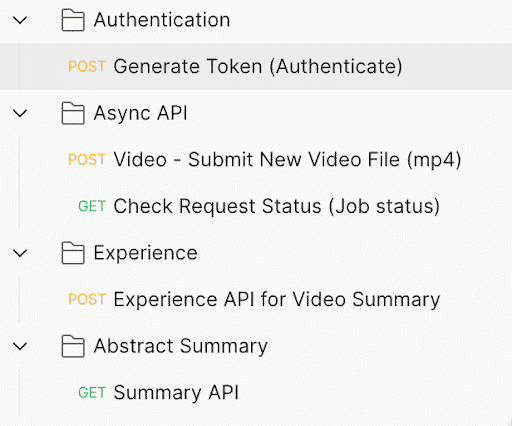Symbl.ai is one of the most extensible API platforms in the market for adding machine learning to your sales workflows. Symbl.ai’s Conversation Intelligence API platform analyzes voice, video, or text conversations that enables developers to create new experiences throughout the entire communication touchpoints of the sales process. Using Symbl to process meeting or call recordings using Async APIs, fetching a pre-built customizable video summary experience summarizing the call in a few lines with context enables developers to use existing recordings in their product or solutions and convert it into intelligence for their sales team.
- Symbl.ai’s Postman Public Workspace for a Sales Automation Pipeline groups these different API calls together for developers to git, clone, or fork into their own development environments for automating sales processes from cold calls to follow ups.
- Symbl.ai’s support for APIs is part of a broad initiative to help developers throughout their journeys. Our APIs are designed to facilitate the reduction of what is often described as the “Time to First API Call”—which is how long it takes a user to successfully make an API call with a response.
- Symbl.ai’s public workspace on Postman is meant to help you make that first API call right out of the gate. The following public workspace is designed to reduce the “Time to First API Call” for all of those developers edging to build the next generation of automated sales pipelines.
Here is the link to the workspace.

How to Get Started in the Postman Workspace with Symbl.ai
Register for a Symbl.ai account. Grab both your appId and your appSecret to authenticate with Postman so that you receive your x-api-key. Below is an example of how to authenticate with the Symbl.ai public workspace.
The Postman collection for Sales Intelligence Use Case on Postman is shared here.
Async API
Symbl.ai’s Async API enables developers who are recording and looking to process the sales calls or meetings asynchronously after a call is completed. Already enabled to operate on all of the leading real-time communications platforms from Zoom to Telnyx, Dolby.io to Agora.io, Symbl.ai’s Async API is one of the few APIs on the market for rapidly processing recorded calls anywhere anytime.
Experience API
After a recorded call is captured, Symbl.ai’s APIs return a conversation ID with which to make additional calls to Symbl.ai’s APIs. Among these APIs is Symbl.ai’s Experience API (i.e.: https://api.symbl.ai/v1/conversations/{conversationId}/experience) provides a readily accessible visualization to any automated sales enablement pipeline. The Experience API provides not just a summary of the transcribed voice, video or text exchanges between the speakers but a text summary.
Symbl.ai’s Experience API groups together the results of multiple API calls from the Conversation API.Through individual calls to the Conversation API, you receive follow-ups, questions, action-items, or topics, key elements in a map of different points of interest during a discussion on what to buy or sale, its price, or how much. With the Experience API you receive the result of these API calls together in a single pre-built User Interface.
In that respect the results of Symbl.ai’s Conversation APIs are all displayed as one of the Summary UI’s experiences, enabling speakers from a sales call to figure out the previous call’s points of interest during the discussion. Since the pre-built Summary UI is fully customizable, you can add your brand, company logo, or stylization.
Summary API
Symbl.ai’s Conversation Intelligence API platform provides developers with more than just pre-built experiences. You only need to process a conversation once to get access to all the AI and understanding tasks on conversations. Developers can use Symbl Async APIs to process all the recording content once to synthesize massive amounts of information in different use cases by using the Conversation API.
Unlike AWS, Google or IBM, you do not need to ingest your data again for accessing the different language understanding tasks.
For a sales conversation: one or many conversations with customer and sales executive may cover a vast amount of information about a product integration, a request for a new feature, an update, an Software Licensing Agreement or many, many, many more important topics. Symbl.ai’s Summary API simplifies the vast amount of information from conversations into raw, extensible, intelligence for automation.
After a recorded call is processed with Symbl.ai’s Async API, a developer who seeks to synthesize those vast amounts of conversation data, may invoke Symbl.ai’s Summary API for a summary of the call’s description in less than 20% of the size of the call transcript.
This is an abstractive summarization that regenerates information based on understanding and context unlike other extractive methods that are not well suited for conversation data.
Conclusion
The Async API together with both the Experience API as well as the Summary API enable Zoom, Telnyx, Dolby.io, or Voice API developers to double down on the way that recorded calls are used as data for the call’s objective. Symbl.ai’s Conversation Intelligence API platform provides developers with the ability to group its APIs together to transform the process of analyzing calls for post-meeting summaries or summaries.
Symbl.ai’s Workspace for a Sales Automation Pipeline is only one of many ways Symbl.ai’s APIs may be grouped together to provide augmented conversation intelligence to voice, video, or message interchanges.
If you are a developer who just tried this workflow with Postman and Symbl, here are some of the other things you are do beyond this:
- Using the same conversation ID, call the other endpoints in Conversation API that lets you fetch sentiments, topics, analytics in json.
- Push the data fetched using the Conversation API to other tools used in the sales pipeline like Salesforce CRM or a B.I Dashboard
- Run aggregated analytics and queries across multiple conversations to identify patterns on what works in a sales call (i.e.: most trending topic before closing a deal, no. of customer touchpoints regarding pricing before signing etc.)
